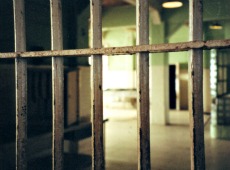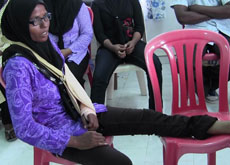Maldivian victims of systemic and systematic torture that has been occurring for decades have yet to find redress, while the legacy of wide-scale human rights violations continues to be perpetuated by state institutions due to institutionalised impunity, government, state institutions and civil society organisations have said.
The Human Rights Commission of the Maldives (HRCM) has confirmed it is investigating three recent cases of detainees being tortured by Department of Penitentiary and Rehabilitation Services (DPRS) officers while in the Custodial Reception and Diagnostic Centre (Male’ Jail).
Officials from the HRCM visited Male’ Jail June 2, 2013 after the family of a detainee informed the HRCM on May 31, 2013 that the victim had been beaten by DPRS officers.
In March this year local media reported that the HRCM was investigating allegations of torture in Male’ prison, however due to authorities “not cooperating” with the investigation the HRCM team was forced to visit Maafushi Prison instead.
In response to the allegations, DPRS Commissioner Ahmed Shihan told CNM that thus far no warden was found to have been involved in the torture of detainees and if a prison warden was found to have acted unlawfully, action will be taken against the officer.
“We will keep monitoring to ensure that all wardens act according to the law,” said Shihan.
In May 2011, former Prisons Division Head of the DPRS Isthafa Ibrahim Manik was detained and questioned by police, after disturbing photographs of tortured victims in custody were obtained by the – now dissolved – Presidential Commission and leaked to the media.
While instances of Maldivians in state custody suffering human rights abuses remains problematic, it is symptomatic of a long standing history of torture that has yet to be remedied or seriously addressed.
“It is quite worrying that we keep hearing about accounts of torture in custody. These recent accounts are an indication of the consistence and continuing abuse in custody,” Maldivian Democracy Network (MDN)’s Executive Director Humaida ‘Humey’ Abdulghafoor told Minivan News yesterday (July 13).
“There is systemic and systematic abuse of detainees [in the Maldives], therefore the practice of torture is unlikely to just disappear over a short period of time,” she emphasised.
While the HRCM’s national preventative mechanism should protect people from the state committing human rights violations, Humaida believes this mandate has been inactive and not working effectively.
“The HRCM has a national preventative mechanism that legally obligates them to ensure mistreatment of prisoners is prevented from happening in jails,” she said.
“Monitoring and oversight is very important because of the history we have, but this mechanism is not working effectively,” she added.
Given the physical and psychological harm torture victims suffer that “cannot be dissociated”, supportive mechanisms that account for this trauma need to be established for Maldivians, explained Humaida.
“There must be an enabling environment for victims to come forward, which doesn’t seem to be there,” she said.
“Many families and victims are afraid and not willing to talk or report these violations because they feel intimidated [by the state] given the risks of revictimization and possible harassment,” she continued.
“Things on the surface may appear quiet, however that doesn’t mean everything is good,” she noted.
Humaida explained that without an enabling environment for victims to report the human rights abuses they have suffered, there is subsequently a lack of documentation and enquiries that would ultimately identify the root causes and/or perpetrators of torture in the Maldives.
“It is impossible for HRCM to know how this torture is happening without proper documentation and enquiries,” she said.
“The Torture Victims Association (TVA) is the only organisation doing such work,” according to Humaida. “The TVA [also] submitted torture victims’ testimonies to the HRCM February 6, 2012, which the victims were able to provide because they no longer felt afraid.”
“A report [by TVA and international NGO Redress] about ill treatment of prisoners was submitted to the HRCM in July 2012, containing the most concrete evidence produced regarding torture occurring while in detention,” she continued.
“Victims’ testimonies were also presented to the UN Human Rights Committee [July 2012 in Geneva], which made recommendations that the Maldives has not yet implemented,” she added.
Reports that included testimonies of police brutality, in addition to torture and ill-treatment of detainees in jail, were presented during the meeting held in relation the to International Convention on Civil and Political Rights, which the Maldives is a signatory.
It has been over a year since the reports were submitted and Humaida cited the “inactivity and apathy of authorities” as a possible reason there has not been any action to redress these past, wide-scale instances of torture.
“I’m very surprised the HRCM has not given updates on how these investigations are proceeding,” she said.
“[Additionally,] while they used to visit prisons regularly and produce reports, that is not something they seem to be doing anymore, which is also a concern,” she added.
HRCM mandate limited
The HRCM mandate specifies that the commission’s focus should be on incidents post-2000, however there is a clause that does allow investigations of past human rights violations if a case is “serious enough”, HRCM Vice President Ahmed Tholal explained to Minivan News yesterday (July 13).
“Torture occurs when state authorities function with impunity, which does not produce a society that is respectful toward human rights,” said Tholal.
He explained that the HRCM is coordinating a strategy to holistically approach past human rights violations on a wider scale.
“We have discussed as a commission how to address human rights violations on a wider scale and how to approach cases to systemically root out torture,” Tholal stated.
“It is very important to ensure absolvement of that feeling [state authorities function with impunity] amongst the people,” he continued.
“The Maldivian people need some sort of redress and closure,” he added.
In regard to the accounts of torture submitted to the HRCM last year by TVA and Redress, Tholal explained that if a human rights violation has occurred then the HRCM looks into the issue on a case by case basis and that allegations of torture submitted by the organisations are currently under investigation.
“We are currently looking into the complaints of each victim [from the reports]. However, some information and evidence is hard to come by,” said Tholal. “For example, we are not able to contact the actual people directly, we have to seek their contact information from the organisation. But we are trying to move as fast as we can.”
Institutionalised impunity
Meanwhile, the Commonwealth Ministerial Action Group (CMAG) was given an update on the current human rights situation in the Maldives this past April, by MDN in collaboration with the International Federation for Human Rights (FIDH).
The brief noted that while some steps have been taken in the past decade to reform institutions and investigate allegations of human right abuses, including torture committed by the security services, limited mandates, a lack institutional will, and senior officials publicly dismissing these concerns has prevented redress.
“A culture of impunity has been institutionalised for perpetrators of past human rights violations that… encourages the security forces to disregard the rule of law and commit further human rights abuses in impunity,” stated the brief.
In September 2012, FIDH released a report detailing the human rights situation in the Maldives, titled “From Sunrise to Sunset: Maldives backtracking on democracy”.
FIDH noted that the government of President Mohamed Waheed Hassan Manik has been accused of a wide range of human right violations, including violent harassment of street protesters, torture and harassment of pro-opposition media as wells as legal and physical harassment of the opposition.
“Practices to silence political dissent that had disappeared in the course of Nasheed’s presidency, have once again become prevalent under Mohamed Waheed’s presidency,” said FIDH.
Police station and prison torture
 There are many accounts of the systematic and sustained use of torture within the state’s prisons and police stations perpetrated by military personnel, police, coast guard, and prison officers, according to the Redress/TVA report which included accounts of individuals who allege that they were tortured or ill-treated during former President Maumoon Gayoom’s regime between 1978-2008.
There are many accounts of the systematic and sustained use of torture within the state’s prisons and police stations perpetrated by military personnel, police, coast guard, and prison officers, according to the Redress/TVA report which included accounts of individuals who allege that they were tortured or ill-treated during former President Maumoon Gayoom’s regime between 1978-2008.
“Most victims were initially tortured or ill-treated during interrogation and questioning, either at police stations or at various detention centers,” stated the report. “Torture and ill-treatment continued in prisons and detention facilities, typically as a form of intimidation and punishment.”
“But until now, the victims of such treatment have not been provided with any justice for what has been done to them. Despite accepting that torture and ill-treatment occurred on a wide scale, the Maldives is yet to address its legacy,” the report noted.
The findings highlighted that “While there was no apparent limit to the forms of torture and ill-treatment used, many were quite specific to the island environment.”
Torture and ill-treatment of detainees was often inflicted outside the prison buildings, and guards appear to have been given free range to use whatever methods they choose, including: beatings, burning, being tied to palm trees, the use of high-pressure hoses, the use of stocks and other painful restraints as well as suspension, near drowning, being restrained and covered in sugar water to attract ants, subjection to noise and sleep deprivation, sexual abuse and sexual humiliation, etc., the report found.
The government of Maldives previously acknowledged that the use of torture was systematic in the country, as stated in its Universal Periodic Review report to the UN Human Rights Council in 2010.
However, current government officials deny torture and ill-treatment of detainees is problematic, and claim that human rights reports conducted by civil society organisations are subject to political bias in favor of the Maldivian Democratic Party (MDP).
Meanwhile, former President Mohamed Nasheed – a previous torture victim himself – pledged to institute structural changes to reform police and military institutions upon his re-election in September, during an MDP function held at the JW Marriott Hotel in Kuala Lumpur, Malaysia July 13.
The Department of Penitentiary and Rehabilitation Services (DPRS) and Maldives Police Service (MPS) had not responded to enquiries at time of press.
